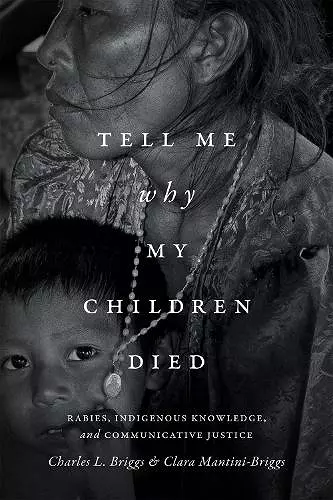Tell Me Why My Children Died
Rabies, Indigenous Knowledge, and Communicative Justice
Charles L Briggs author Clara Mantini-Briggs author
Format:Paperback
Publisher:Duke University Press
Published:27th May '16
Currently unavailable, and unfortunately no date known when it will be back
This paperback is available in another edition too:
- Hardback£89.00(9780822361053)

Tell Me Why My Children Died tells the gripping story of indigenous leaders' efforts to identify a strange disease that killed thirty-two children and six young adults in a Venezuelan rain forest between 2007 and 2008. In this pathbreaking book, Charles L. Briggs and Clara Mantini-Briggs relay the nightmarish and difficult experiences of doctors, patients, parents, local leaders, healers, and epidemiologists; detail how journalists first created a smoke screen, then projected the epidemic worldwide; discuss the Chávez government's hesitant and sometimes ambivalent reactions; and narrate the eventual diagnosis of bat-transmitted rabies. The book provides a new framework for analyzing how the uneven distribution of rights to produce and circulate knowledge about health are wedded at the hip with health inequities. By recounting residents' quest to learn why their children died and documenting their creative approaches to democratizing health, the authors open up new ways to address some of global health's most intractable problems.
"Briggs and Mantini-Briggs do more than shed light on a tragedy—they give voice to the grieving parents and offer examples of innovative ways to combat health disparities around the world, such as examining the 'relational division of the labor of producing and circulating health knowledge.'” -- Tracy Gnadinger * Health Affairs *
“There are no easy explanations in this book, but it serves a valuable role by reminding us that lofty ideological claims and even passionate practical commitment are, in themselves, insufficient for eradicating deep structural inequalities, the real solutions to which can sometimes only be found among the people themselves.” -- Eugene Carey * Latin American Review of Books *
"It is in this combination of ambitious scope and gut-wrenching intimacy that Tell Me Why My Children Died really shines. This book is a model not just for anthropologists interested in epidemics (Ebola and Zika were frequently on my mind while I was reading, and they are occasionally invoked in the text), but, just as importantly, for readers interested in a first-hand account of the messy, frustrating and ambivalent work of communicating calls for justice." -- Alex Nading * Journal of Latin American Studies *
"This ethnography will undoubtedly be embraced by scholars and graduate students in the fields of medical and linguistic anthropology, Latin American Studies and Indigenous Studies. Nevertheless, in my opinion, a book like this is most needed to encourage critical approaches to communication, global health and public health disciplines, as well as engaging lower level students in sophisticated discussions around contemporary American societies." -- Nicole S. Berry * Bulletin of Latin American Research *
"The book will be useful and provocative for researchers, students, and faculties in the social sciences, medicine, and science and technology studies. I strongly recommend it." -- Linda M. Whiteford * Ethnohistory *
ISBN: 9780822361244
Dimensions: unknown
Weight: 499g
344 pages